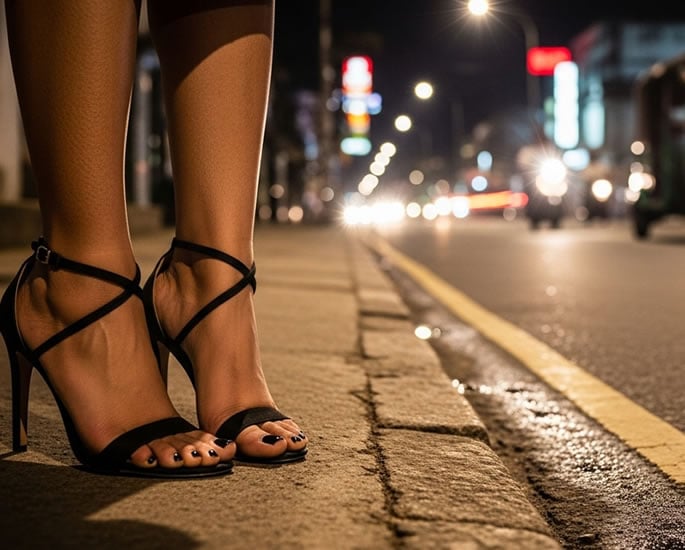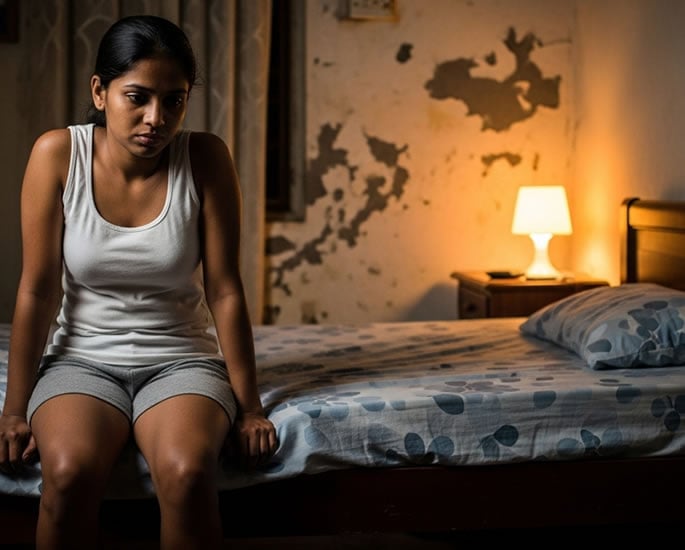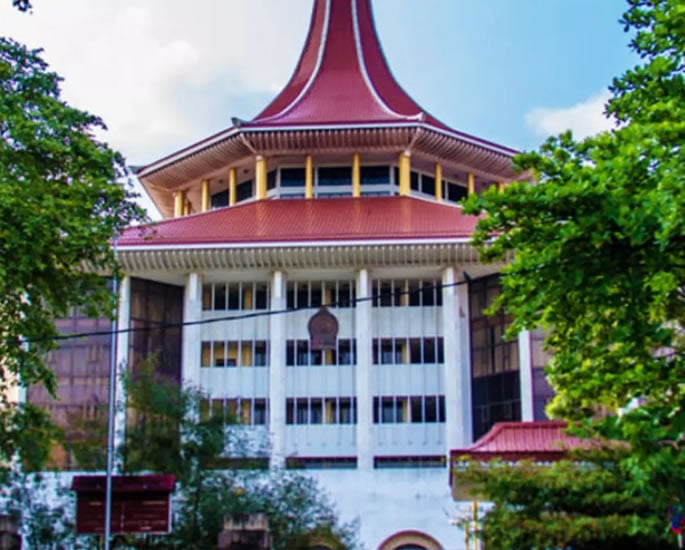“Sri Lankan law provides provisions to deal with offences of sex workers"
In a country often portrayed as a serene Buddhist haven, Sri Lanka’s relationship with prostitution is anything but peaceful.
Although not illegal, related activities such as soliciting, procuring and brothels are outlawed.
This makes sex work in the country a complicated and contradictory matter.
A 2023 paper by Kusal Amarasinghe, titled Legalisation of Prostitution: A Review of the Sri Lankan Context with Comparative Analysis digs into the contradictions.
The academic paper examines the legal, social, and medical realities of sex work in Sri Lanka and compares them to global frameworks.
Through interviews and comparative research, Amarasinghe exposes the complex intersection between crime, culture, and commerce that defines the country’s approach.
Prostitution, he writes, is “an ambiguous concept. It always contradicts social, cultural and legal norms and standards”.
That contradiction sits at the heart of the Sri Lankan experience, where the law condemns, society shames, but the streets continue to trade.
The Law and the Street

Legally, prostitution in Sri Lanka exists in a state of confusion.
Selling sex itself is not a criminal offence, yet nearly every act surrounding it, soliciting, brothel-keeping, or even “behaving indecently”, can land a person behind bars.
The laws governing this moral minefield were never designed for modern Sri Lanka.
They are relics of British colonial rule, most notably the Vagrants Ordinance of 1841 and the Brothels Ordinance of 1889. Both continue to shape how police interpret and enforce morality.
Under Section 3(1)(b) of the Vagrants Ordinance, “every common prostitute wandering in the public street or highway, or any place of public resort, and behaving indecently” can be deemed a vagrant.
The law doesn’t define what a “common prostitute” is, leaving space for arbitrary interpretation.
Amarasinghe notes that it is the “key legal instrument that is used by Police to arrest street prostitutes”, often with little oversight or consistency.
Similarly, the Brothels Ordinance criminalises anyone who “keeps or manages or acts or assists in the management of a brothel”.
The term “brothel” itself is open to legal debate. In Dhorati Silva vs OIC Vice Branch Pettah, the Supreme Court broadened the definition of management to include “administration or control”, effectively expanding the scope of what can be criminalised.
While the laws appear to target both operators and clients, in practice, it is the women, often poor and marginalised, who face the brunt of punishment.
Amarasinghe highlights that “Sri Lankan law provides provisions to deal with offences of sex workers where money or consideration is exchanged”, showing how moral panic has been institutionalised rather than reformed.
Further amendments to the Penal Code, particularly Section 360(A), introduced in 1995, criminalise anyone who “procures a person to become a prostitute within or outside of Sri Lanka”.
These updates were designed to tackle trafficking and coercion, but in reality, they have blurred the lines between voluntary and forced sex work.
More than 180 years after the Vagrants Ordinance, Sri Lanka still polices poverty and sexuality through Victorian law.
The result is a system where prostitution exists in the shadows, not because it is invisible, but because it is inconvenient to acknowledge.
Morality and Survival

To understand why sex work endures, one must look beyond the courtroom and into the social fabric.
Amarasinghe’s research cites BGIM Samarasinghe (2018), who called the sex industry in Sri Lanka “a social issue beyond a social problem”.
It is not merely about morality, but about economic survival.
The study identifies several forces pushing women into prostitution: “economic difficulties in the family, illiteracy, unemployment, and difficulty in finding jobs.”
Many of these women, Amarasinghe writes, are “compelled by economic and social inequality and by terribly restricted life chances”.
In a country where female labour participation remains low and social mobility is tied to marriage, sex work becomes a last resort, and sometimes the only one.
The contradictions go deeper.
In a patriarchal society where women are taught that modesty equals virtue, the existence of prostitution is both condemned and quietly consumed.
Clients, many of them married men, rarely face the same moral or legal scrutiny. Meanwhile, the women, often women or widows, become symbols of shame.
Amarasinghe’s paper notes that “sex work gives many uneducated and unskilled women an income that far exceeds that which they can obtain in any other occupation”.
Yet this financial empowerment does not translate into social acceptance. Instead, the same society that benefits from the trade publicly denounces it.
Some women are also victims of coercion and trafficking.
Debt bondage remains a dark reality, where “those women who are held in debt bondage may receive only a fraction of the money paid by clients”.
These are not isolated incidents but symptoms of a system that refuses to recognise sex workers as workers.
In Sri Lanka’s urban underbelly, Colombo’s lodges, Negombo’s beach shacks, Kandy’s backstreets, sex work thrives because morality has failed to provide alternatives.
As one social worker interviewed in the paper explained, the trade is not driven by choice but by “the inability to survive in any other way”.
Health Risks and Hypocrisy

The conversation around prostitution in Sri Lanka cannot ignore the health crisis tied to it.
The World Health Organisation says female sex workers are estimated to be 30 times more likely to be living with HIV than other women of reproductive age.
This emphasises how public health and morality often clash in policy.
According to the study, “most of the STD-related health issues are reported among sex workers and their clients”.
The most common infections include genital herpes, gonorrhoea, syphilis, and genital warts.
While Sri Lanka maintains a “low-level HIV epidemic, with HIV prevalence estimates below 0.1%”, the lack of awareness and low condom use make the situation precarious.
The paradox is striking.
Sex workers are labelled immoral, yet little is done to safeguard their health or educate them about disease prevention.
Public health programmes targeting sex workers exist but remain underfunded and stigmatised.
This hypocrisy extends beyond health policy; it reflects how Sri Lanka’s moral framework undermines its humanitarian responsibilities.
Amarasinghe points out that “lack of awareness about STDs and especially lack of safety precautions such as using condoms can be considered as the main reasons for the spread of STDs among sex workers”.
In other words, moral condemnation replaces medical intervention.
The women most at risk are often those least protected. They are arrested, not assisted; silenced, not supported.
And in a society where discussing sex is taboo, even public education on safe practices is politically fraught.
The result is a quiet public health crisis that thrives in the dark, sustained by denial and stigma.
Legalisation and the Cultural Wall

Globally, approaches to prostitution vary dramatically.
Amarasinghe’s comparative analysis shows that prostitution is legal in the Netherlands, Germany, Austria, Finland, Denmark, Greece, Hungary and Latvia.
In each of these nations, regulation has allowed sex workers to access legal protections, health services, and safer working conditions.
New Zealand’s Prostitution Reform Act of 2003 decriminalised sex work to “protect workers from exploitation” and “promote health and safety”.
By contrast, most of Asia, including Sri Lanka, continues to criminalise or ignore it. In Sri Lanka, it is shaped not just by law, but by culture.
In a country where Buddhist and conservative values dominate public life, open discussion of sexuality is rare.
Amarasinghe concludes that “prostitution is kind of a universal practice but it does not have a universal value”.
That observation reflects the heart of the debate: even if sex work is a global reality, it challenges the moral identity Sri Lanka wants to project.
Attempts to legalise or decriminalise prostitution often meet fierce resistance. Critics argue that it would erode traditional values or promote immorality.
Yet the current system already sustains abuse, trafficking, and disease.
The refusal to reform doesn’t eliminate prostitution; it simply ensures that those within it remain invisible.
In Amarasinghe’s words, “though there are some arguments for the legalisation of prostitution, society is still not ready to accept it”.
The gap between policy and reality is wide, and until Sri Lanka confronts its contradictions, sex work will continue to operate in the margins – policed but profitable, hidden yet ever-present.
Prostitution in Sri Lanka exists in the shadows of law and morality.
It is not simply an act of defiance but a mirror of the nation’s inequalities: economic, gendered, and social.
The colonial laws that once defined vagrancy still dictate who deserves dignity. The moral codes that claim to protect women often imprison them in silence.
As Amarasinghe’s research makes clear, prostitution is both symptom and symbol. It reveals the hypocrisy of a society that condemns what it quietly sustains, and a state that enforces outdated laws to hide its failures.
The debate over legalisation will not end soon, because the issue is larger than law; it is about how Sri Lanka defines virtue, power, and survival.
And as long as that debate remains taboo, the oldest profession in the country will remain its most enduring secret.






























































